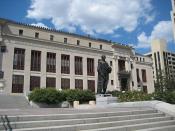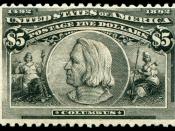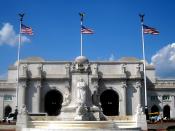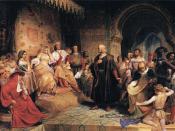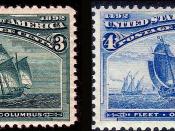Christopher Columbus Daniel J.Boorstin, who has served as director of the Library of Congress, director of the National museum of American History, and senior historian of the Smithsonian Institution in Washington, D.C. Howard Zinn is currently an associate professor in the Department of Government at Boston University. Base on the background of both of these writers it is clear on how they feel about a very important piece of history. Although they both write about Christopher Columbus's "discovery" of America, their perspectives are very different on Columbus's motivation and interests, and their analysis of the effects on Indians are a lot different too.
In Boorstin's essay "A History of Man's Search to Know his World and Himself", he described Columbus was a great adventurer, a kind of entrepreneurial visionary who took a huge risk on a big idea, placed his faith in the latest navigational technology, and also a man who was fearless in his quest to discover the new world of the wonderful things that it had to offer.
This is made clear when boorstin states " With so little experience of the interior and such ambiguous clues to the Oriental character of the country, Columbus remained undaunted in his faith. His report revealed no doubt that he had reached 'the Indies.'"(Boorstin 2) Truly, Columbus was on a mission of exploration and novation. As Columbus sailed through all those unknown sea, he came across things that he had never seen before, things which gave him a sense of euphoria, "For he mainly enjoyed the sights and sounds and curiosities which he could witness from the coast." (Boorstin 1). So Boorstin reveal that those sense of bewilderment played an important role in Columbus's motivation of doing all the sailing.
But when Howard Zinn writes about Columbus in his " Columbus, the Indians, and Human Progress," a different point of view of Columbus emerged before us. According to Zinn, Columbus was a merchant's clerk from the Italian city of Genoa, part-time weaver, and expert sailor. In Zinn's essay, Columbus's true motivation for going out to the sea was not because he loved adventure or exploration, but because he was offered by the Queen to become financially prosperous and increase his status among society. According to Zinn, "In return for bringing back gold and spices, they promised Columbus 10 percent of the profits, governorship over new-found lands, and the fame that would go with a new title: Admiral of the Ocean Sea."(Zinn 3) So Columbus was motivated by those insatiability and greed.
On the other hand, Boorstin continue to point out that Columbus was a great leader and that he was very affable to the native people of Indies. By the time Columbus arrived to the new world, he was greeted by the local native who immediately warmed to his presence. He also found out that the native people were ingenious and care free with whatever they had, and Columbus wrote the Queen that "The native are so ingenious and free with all they have, if it be asked of them, they never say no; on the contrary, they invite you to share it and show as much love as if their hearts went with it, and they are content with whatever trifle be given them, whether it be a thing of value or of petty worth." (Boorstin 2) Columbus was also described as a God-fearing man when Boorstin mention in his essay that Columbus wanted to help the local natives by guiding them through the conversion into his religion, "Which I hope that their highnesses will determine upon their conversion to our holy faith, towards which they are much inclined." So according to Columbus's behave, he was trying to improve the relation with the native people.
But Zinn, on the other hand continued to portray Columbus as a selfish individual who only interested in what he looked for and didn't care about the native people or discovering new lands. The writer describe Columbus as a man who was greedy and that greed him to the worst of all crimes such as sexual violence and cruel act of slavery. Columbus's mind-set towards the native Indians was very unenthusiastic and unconcern. For him native Indians existed just to provide him with all the gold he asked for and whatever amenities he demanded. That also gave way for Columbus to make statements to his countrymen that there were abundance of precious minerals and slaves in return for their future investment. Again he presented to the Queen that there was "As much as gold as they want if their Highnesses will render me a little helpâ¦..and slave, as many as they shall order, who will be idolaters."(Boorstin 2) Columbus kept on stated these words so he could receive more help from the Queen as well as his countrymen.
Unlike Boorstin, Zinn provides more documentation when they both describe what kind of person Columbus really was. Zinn continue to reinforce his idea that Columbus was a cruel and voracious individual, "All persons fourteen years or older to collect a certain quantity of gold every three months. When they brought it, they were given copper tokens to hang around their necks. Indians found without a copper token had their hands cut off and bled to death." So being afraid could not pay back dividends to those who had invested, Columbus just gave the innocent native people impossible task. He also took aboard his ship with hundreds of man, women and children who were to serve as slaves in Spain. But unfortunately, over half of them died on the way. For Zinn, Columbus was only a murderer, a monster who would do anything terrible in order to reach his interest, again the writer states, "Among the Arawaks, mass suicides began, with cassava poison. Infants were killed to save them from the Spaniards. In two years, through murder, mutilation, or suicide, half of the 250,000 Indians on Haiti were dead."(Zinn 4) After comparing and contrasting both of the author's perspectives on Christopher Columbus. I realize that there's more than one way to tell the story, also storytelling is a lots depends on the individual point of view. I also learn that there is such thing like "official story" which try to decorate the untrue story into the beautiful one. In the conclusion, Boorstin as a historian serves to teach the audience, all of Columbus's achievements and reasons for doing what he did. Zinn on the other hand serves to inform us on the true side of Columbus. By comparing these two essays, we also learn that it is our responsibility to try and formulate our own opinion based on the information that has been given to us.

